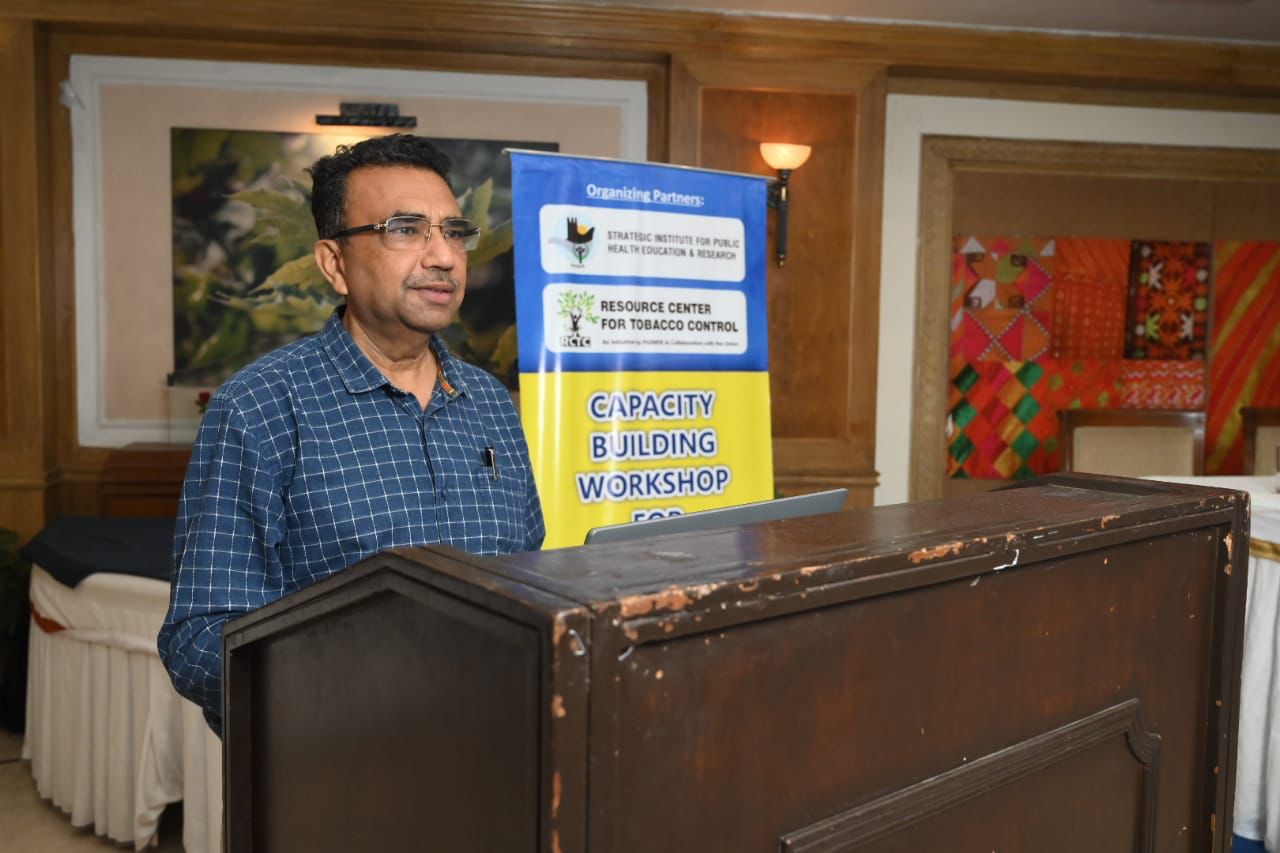Chandigarh 18th June 2022
A capacity building workshop for members of Taskforce of tobacco control, UT Chandigarh and Civil Society Organisations for better implementation of COTPA and other Anti-tobacco laws was organized by the Strategic Institute for Public Health Education and Research (SIPHER) in collaboration with E-Resource Centre for Tobacco Control (e-RCTC), Dept. of Community Medicine, PGIMER and World Health Organization (WHO), Tobacco use is the leading cause of 14% Non-Communicable Diseases including cancer, and result in 1.4 million deaths in India and 7 million deaths in the world, yearly, said Dr Sonu Goel, Director, Resource Centre for Tobacco Control (E-RCTC) and Professor, Department of Community Medicine and School of Public Health, PGIMER, Chandigarh. He suggested to improve tobacco selling vendor compliance with awareness of tobacco vendors and a stricter implementation of tobacco control laws to reduce tobacco use among the youth. Future studies should test strategies to improve compliance with tobacco POS laws, particularly in low-income and middle-income country settings, he further added that, E-RCTC has recently been awarded with Regional Director’s Special Recognition Award by World Health Organization in recognition of its efforts towards tobacco control in India on World No Tobacco Day-2022.
Based on his experience of recently conducted awareness drive for tobacco vendors in three jurisdictions of North India and the observation of compliance to anti-tobacco laws including COTPA at , at more than 750 Points of sale, Dr Rakesh Gupta President SIPHER, a WHO Awardee and a former DHS Punjab deliberated that the tobacco vendors are unaware about anti-tobacco laws and the compliance is poor. Hence, Tobacco Vendor Licensing (TVL) is a good strategy for supply reduction to achieve Endgame Tobacco, Dr Gupta proposed. Emphasizing on the Govt. of India initiatives, he said that a Letter was sent by MOHFW to all states on 21st Sept 2017 and Ministry of Housing and Urban Affairs, Government of India to Principal Secretaries Dept of Local Government of all states and UTs to initiate the process of TVL on 31st March 2021. About seventy jurisdictions in various states in India have issued Vendor Licensing notifications to date ranging from the state level, district level & Municipal Corporation level orders.
He also appreciated the Chandigarh administration, Punjab and Haryana Governments and the role of Police department in curbing the menace of Hookah bars and emphasised that online sale of banned E Cigarettes should not be allowed to save youngsters from Nicotine addiction.
Dr Arpit Gupta Associate Prof. PGI Chandigarh presented Tobacco Free Educational Institutes guideline of Government of India which makes it mandatory to Display of “Tobacco free School” or “Tobacco-free Institution ”board at a prominent place on the boundary wall outside the main entrance, No sale of tobacco products inside the premises and Within the radius of 100 yards from school / educational institutions and mandatory signage in this regard shall be displayed prominently near the main gate and on boundary wall of school / institute in addition to other provisions.
Mr. Sukhwinder Designated officer cum Licensing Authority Chandigarh UT deliberated upon the provisions in FSSAI under which Gutkha is banned and that areca nut in pan-masala even without tobacco is carcinogenic.
Mr. Manohar Singh Assistant Controller, Legal Metrology, Patiala Division, talked about the Legal Metrology Act as applicable to Tobacco Products.
Dr Manoj Kumar, Asst. Professor, Department of Community Health, Panjab University elaborated about the Pollution Control Act as applicable to Tobacco Products Waste.
Quoting the benefits of TVL, Mr Rajeev Project Coordinator, E-RCTC, PGIMER, Chandigarh emphasized the implementation of TVL for decreasing the availability and accessibility of tobacco products particularly to youngsters by decreasing the number of vendors, especially in the vicinity of educational institutes.
Dr G B Singh, Director Health Services (ESI), Punjab raised a concern over the figures that 38 percent of cigarettes, 47 percent of bidi, and 52 percent of smokeless tobacco users picked up the habit of smoking before their 10th birthday and emphasised on the multi-Stakeholders in tobacco control.
Mrs Harjinder Kaur Chairperson Chandigarh CCPCR Commission for Child Protection Rights was of the view that CPCR has a very important role to play in Tobacco Control and protect kids from getting addicted to this gateway drug.
Ms Jyoti Bainda, Chairperson Haryana State Commission for Child Protection Rights highlighted that no one can even offer Tobacco to a minor under section 77 of Juvenile Justice Act (JJ ACT) and its violation attracts an imprisonment of 7 years and a fine of 1 Lakh Rupees. TVL will definitely improve compliance to JJ Act, she further added.
Dr Jyoti Tiwari, Principal School of Nursing Chandigarh University emphasised that TOFEI must be implemented in letter and spirit in all the educational institutes including colleges and universities.
Mr Arun Verma, Director Operations SIPHER and an alumni of JHSPH USA concluded the workshop saying that it was overwhelming that more than 80 participants attended the workshop with enthusiasm and that TVL would help in the effective monitoring of the tobacco vendors and denormalization of the use of tobacco.
Discussions
Discussions
